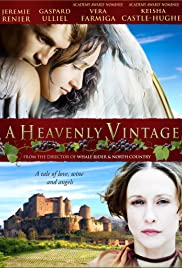
THE VINTNER’S LUCK
France/New Zealand, 2009, 120 minutes. Colour.
Jeremie Renier, Gaspard Ulliel, Keisha Castle- Hughes, Vera Farmiga.
Directed by Niki Caro.
The Vintner’s Luck is a story of early 19th century France. It was based on a novel by Elizabeth Knox. The novel is difficult to transfer to the screen because of its supernatural elements. This includes the central character experiencing the visit from an angel (fallen or not?) every year on the same day. The angel helps him with his life, with the vintage, with his relationships. The central character has a strange, loving relationship with the angel, although they clash at many times during the passing years. Ultimately, the angel decides (akin to Wings of Desire) to stay on Earth, become human, have his wings surgically removed.
The French setting is beautiful, the countryside photographed quite exquisitely. The film takes place over many years, the development of the vines, the vintage, the production of wine. The film is one not only of sight and sound, but suggestions for smell, feel and, especially, taste.
Jeremie Renier is credible as Sobran, the young man who knows how to grow grapes, who knows how to create new wines. Keisha Castle -Hughes (who got an Oscar nomination for her performance in Niki Caro’s The Whale Rider) portrays his wife. One of the strange things about her appearance is that she doesn’t seem to age throughout the years of the film.
Gaspard Ulliel is the angel, a very difficult role to perform – and may attract or alienate audiences.
On the other hand, Vera Farmiga as the baroness who goes into partnership with the hero is quite persuasive.
On the realistic level, the film is interesting in its recreation of a particular period and a particular place, focusing on the growing of grapes and the vintages. On the emotional level, it does not draw its audience in as it might, especially with the passionate relationship between husband and wife which cools. The character of the baroness is rather enigmatic at times. But, the main difficulty is with the angel.
1. An interesting period film? The blend of reality and fantasy?
2. France in the 19th century, the beautiful countryside, the way that it was filmed? The vineyards, the village, the homes, the vintage, the chateau? Costumes and décor? The musical score?
3. A sensual film, look, smell, taste, feeling? The emphasis on the taste of the wines? The sounds and images for the changing seasons and the vintage?
4. The credibility of the plot, on the realistic level, the story of Sobran and his wife? The baroness? The credibility of the angel and his appearances?
5. The portrait of Sobran, his life, age, the years passing, his work, with his family, impetuous, ambitious, initially being laughed at? His love for Celeste? Their passion? The marriage? The children, the family life over the years? But his focus on the vintage?
6. The appearance of the angel, physically, the wings and their width, his blue shirt, his body? Audience response to the angel? Suspending disbelief? Gaspard Ulliel and his appearance and performance? His voice? Not ageing? A fallen angel or an angel of grace? Guardian angel? His friendship with Sobran, the limits, the yearly visits, the information about the vines, the nature of the soil, getting Sobran to taste it? The crops on the ridge? The initial success? The years, not so successful, yet producing the wines? The description of the various tastes of the wine, especially Sorrow? Deaths? The angel’s attitude towards Celeste, towards the baroness? Sobran and his anger with the angel, their fight? The scene of the angel flying and soaring? The decision of the angel to come to Earth, the cutting off of his wings? His working as an ordinary member of the town? Giving the sip of wine to Sobran at the opening of the film and the closing?
7. Celeste, the comments that her parents were mad? Sobran’s love for her, the scene of the blessing of the gifts, the marriage, the children? In the background, her silence? Yet her touches of jealousy, the baroness, the lotion? At the end with Sobran’s death? Her not seeming to age? In comparison with her children? The effect of her child’s death on her?
8. The baroness, at the chateau, her father, the bequest, the chateau buying the wine? The crops? The baroness’s father and his advice, her approaching Sobran? Getting him to work for her? His teaching her to taste the wine, the blindfold, her seeming inability, his persuading her to let her feelings go and taste? The partnership? The work over the years? Her illness, the need for the operation? Sobran’s deal with her, that he would be a partner if she had the operation? Their sexual encounter? The baroness and her seeing the angel, the cutting off of the wings? Sobran’s death?
9. Sobran’s achievement, the meaning of his life, the sadness in his life, the importance of the wine, the tasting? The issues of his luck, his fate, his choices?